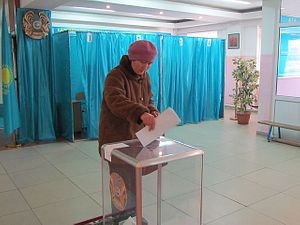A decade ago, an electoral phenomenon arose within the post-Soviet sphere. “Zombie monitors,” they were called. Organizations and individuals, arriving with little discernible track record, stamping the autocratic elections – in Uzbekistan, in Tajikistan, in Azerbaijan – as free and fair outpourings of support for the incumbent. Some of them carried websites. Few carried any contact information. Most, however, brought one factor that domestic election monitors – or those from the Shanghai Cooperation Organization, or the Commonwealth of Independent States – couldn’t provide: Westerners.
These Westerners brought credence, supposedly. Hailing from democratic nations themselves, it didn’t matter whether or not they actually had any experience observing elections. All that mattered was their citizenship. If they had prior political background, all the better; elections served as one more avenue for these governments to utilize their methods of “caviar diplomacy” to wine and dine current and former Western politicians into overlooking the electoral shortcomings and cite the “progress” and “transition” apparent. Likewise, it didn’t matter that the observations from these individuals and organizations didn’t always find an audience back in the West. They were largely meant for domestic consumption, something for the respective governments to play up to citizens to spin the vote as an actual election.
This week’s election in Kazakhstan was, unfortunately, no different. While the result of the election was long known – Catherine Putz’s coverage of the run-up and results is well worth a read – what was less known was who Kazakhstan would bring aboard to help sing the praises of this election. These individuals, after all, would have their work cut out for them. Not only did the president claim an other-worldly 98 percent of the votes cast, but he did it on the backs of jailed opponents, crushed independent media, and all the resources the state could provide. Moreover, these observers would be up against the reputation of the OSCE, which noted that the election saw “serious procedural deficiencies and irregularities … throughout the voting, counting and tabulation processes,” in addition to “undue restrictions on suffrage rights, as well as on fundamental freedoms of assembly and expression[.]” The OSCE also observed “indications of ballot box stuffing,” for good measure.
Fortunately for Astana, the government managed to cobble a handful of Westerners willing to tie their reputation to praise of Kazakhstan’s electoral proceedings. The pro-government Astana Times provided a convenient list of such individuals. For instance, former U.S. Rep. Steve Stockman “welcomed the openness” of the election, while Latvian journalist Juris Paiders claimed the event was “a very important democratic event.” British journalist Rupert Goodman noted that he “did not observe anything that led me to question the integrity of the voting process.”
Other Westerners went even further than these observers. Alex Vatanka, a senior fellow at the Middle East Institute, managed to claim that “Washington believes the presidential elections were conducted properly,” according to KazInform. (Just a few weeks earlier, Vatanka also mistakenly stated that Kazakhstan was the first country to voluntarily renounce its nuclear weapons.) Former U.S. Rep. Robert Wexler went so far as to call the election “quite impressive.” According to Wexler, what is “most remarkable” is the “love and affection that … people have for the president.” Added Wexler, “I don’t know of anywhere else in the world today where there is such diversity and yet there seems to be such harmony.”
But the finest example of Westerners helping to whitewash Kazakhstan’s election came not from diplomats or journalists, but from an academic. Sophia A. McClennen is currently an international affairs and comparative literature professor at Pennsylvania State University, with no discernible tie to or background in Central Asia. However, that didn’t stop her from taking to Salon to point out not only the “culturally arrogant” media coverage of the election – citing an Economist article that presented Kazakhstan’s electoral flaws – but also the “things the Kazakhs are getting right – things that we in the United States get wrong.” McClennen proceeds to laud Kazakhstan’s campaign-finance structure and allotted campaign schedule, as well as offering strange praise for Kazakhstan’s language requirements and downplaying media censorship.
To be sure, the room for critique of the American electoral process is ample, and includes plenty of space to hammer issues of funding and nepotism alike. But pointing to Kazakhstan as a model worth emulating – in any instance – is an exercise not only in futility, but in embarrassment. Her write-up has already been dismantled elsewhere, as well as dismembered on Twitter. But it is worth emphasizing just how blinkered such analysis is, and that there are myriad other electoral models worth emulating above Kazakhstan’s dictatorship. Even the putative stability the model was supposed to bring is failing. McClennen misreads, misunderstands, and misconstrues even the most basic realities of the election Kazakhstan just hosted.
The lone redeeming factor of her article – perhaps the lone redeeming factor of Kazakhstan’s 2015 election – is that it has left us with the finest example of Kazakh whataboutism we’ve yet seen. Which is something. But on the backs of another election that saw smothered opposition, imprisoned journalists, and the unsettling finality of Nazarbayev’s cult of personality, the only thing we can learn from Kazakhstan’s election is that autocrats will win, however they see fit.

































